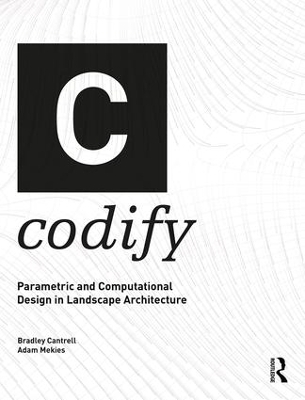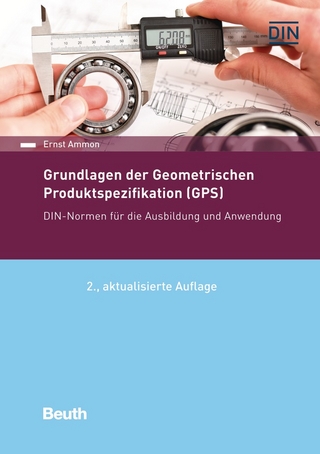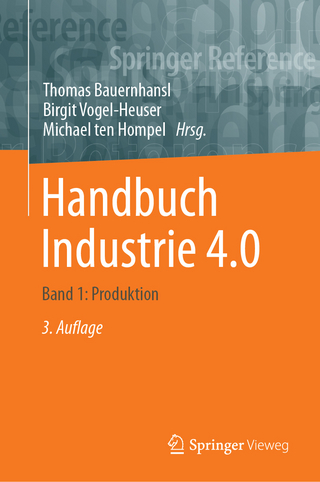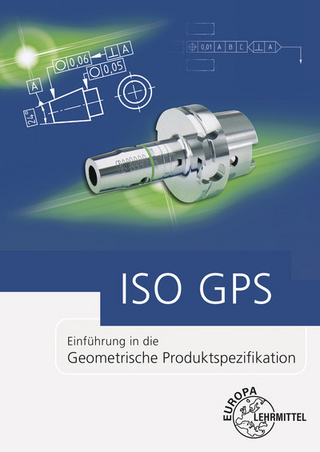
Codify
Routledge (Verlag)
978-1-138-12503-2 (ISBN)
Codify: Parametric and Computational Design in Landscape Architecture provides a series of essays that explore what it means to use, modify and create computational tools in a contemporary design environment. Landscape architecture has a long history of innovation in the areas of computation and media, particularly in how the discipline represents, analyses, and constructs complex systems. This curated volume spans academic and professional projects to form a snapshot of digital practices that aim to show how computation is a tool that goes beyond methods of representation and media. The book is organized in four sections; syntax, perception, employ, and prospective. The essays are written by leading academics and professionals and the sections examine the role of computational tools in landscape architecture through case studies, historical accounts, theoretical arguments, and nascent propositions.
Bradley Cantrell is a landscape architect and scholar whose work focuses on the role of computation and media in environmental and ecological design. He is currently Professor and Chair of the Department of Landscape Architecture at the University of Virginia School of Architecture and has held academic appointments at the Harvard Graduate School of Design, The Rhode Island School of Design, and the Louisiana State University Robert Reich School of Landscape Architecture. His work in coastal and riverine landscapes form a series of methodologies that develop modes of modeling, simulation, and embedded computation that express and engage the complexity of overlapping physical, cultural, and economic systems. Adam Mekies is a licensed landscape architect and planner at Design Workshop in Aspen, Colorado, where he leads many of the firm’s computational and interactive technologies in the construction of the public and private realm. He received his Bachelor of Landscape Architecture from Iowa State University, and has applied his interests in advanced construction modeling and computational technology to design projects across the country and overseas. He is the recipient of multiple ASLA design and research awards for his work in community design and implementation of interactive and parametric technologies.
00.00 . About Code, Christophe Girot
00.01 . Coding Landscape, Bradley Cantrell and Adam Mekies
Syntax
01.00 . Computation in Practice | An Inquiry Into the Business of Computational Design, Paralabs
01.01 . Generative Modeling and the Making of Landscape, Chris Reed
01.02 . 21st Century Learning, Pete Evans
01.03 . The Parametric Park, David Fletcher
01.04 . Big Data for Small Places: Systematizing the functional use of complex and sizeable data sets in daily practice, Elizabeth Christoforetti, Will Cohen, Yonatan Cohen, Stephen Rife, Jia Zhang
01.05 . Turing Landscapes, Stephen Ervin
Perception
02.00 . Landscape Models of the Scientific Imaginary—a visual textual précis, Justine Holzman
02.01 . Computational and Research-Driven Design Methodologies: an enquiry into atmosphere, Jillian Wallis and Heike Rahmann
02.02 . Agent Based Models to Reveal Underlying Landscape Structure, Joseph Claghorn
02.03 . Open Source Mapping + App Development, Chris Seeger
02.04 . From Solution Space to Interface: 6 Actions for Landscape Infrastructure Design, Alexander Robinson and Brian Davis
Employ
03.00 . The Role of Query and Convergence in Next Generation Tool Sets, Anthony Frausto-Robledo
03.01 . Coding Behavior: The Agency of Material in Landscape Architecture, Brian Osborn
03.02 . Beyond Heuristic Design, Brian Phelps
03.03 . The New Maker Culture: Computation and Participation in Design, Andrea Hansen Philips
03.04 . Code Matters: Consequent Digital Tool Making, James Melsom and Luis Fraguada
Prospective
04.00 . Technology, Evolution, and An Ecology of Cities, Kurt Culbertson
04.01 . The Witness, David Fletcher
04.02 . From Documents to Directives: Experimental Fast Matter, Craig Reschke
04.03 . Towards Sentience, Leif Estrada
04.04 . Design for a Mind with Many Bodies, Ricardo Jnani Gonzalez
| Erscheinungsdatum | 28.07.2018 |
|---|---|
| Zusatzinfo | 2 Tables, black and white; 63 Line drawings, color; 99 Halftones, color; 162 Illustrations, color |
| Verlagsort | London |
| Sprache | englisch |
| Maße | 189 x 246 mm |
| Gewicht | 1020 g |
| Themenwelt | Sachbuch/Ratgeber ► Natur / Technik ► Garten |
| Mathematik / Informatik ► Informatik ► Theorie / Studium | |
| Informatik ► Weitere Themen ► CAD-Programme | |
| Naturwissenschaften ► Geowissenschaften ► Geografie / Kartografie | |
| Technik ► Architektur | |
| ISBN-10 | 1-138-12503-2 / 1138125032 |
| ISBN-13 | 978-1-138-12503-2 / 9781138125032 |
| Zustand | Neuware |
| Haben Sie eine Frage zum Produkt? |
aus dem Bereich


